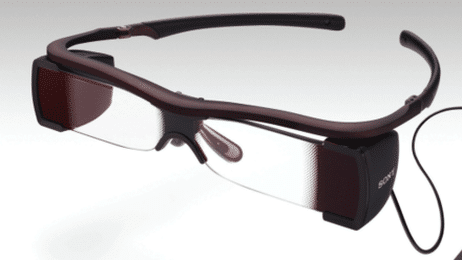New Smart Glasses Help Deaf People Enjoy The Cinema
Peter Donnell / 12 years ago

This is really cool, Sony Entertainment Access Glasses Prototype could sign the end of separate showings in the cinema for those with hearing or sight disabilities and they can do it in a way that literally benefits all movie goers, as well as the theatre it’s self.
“There will be a special attraction for deaf people in theaters nationwide soon. By the end of this month, Regal Cinemas plans to have distributed closed-captioning glasses to more than 6,000 theaters across the country.” – Sony
The set of glasses are not unlike a pair of 3D glasses combined with a basic pair of something similar to Google Glasses. While you watch the movie, captions are projected onto the glasses and give the illusion of the words floating around 10ft in front of the user, these can be used simultaneously or alternatively with audio tracks that give descriptive audio, or even just headphones that boost the audio level for those who are hard of hearing, it will even work with a 3D movie.
This is a really basic idea, the technology is readily available, it just took someone to go first and invest in the technology and Regal have done just that. Now their cinema screens no longer have to run separate showings of movies with audio description or subtitle and now no one with sign or hearing issues need feel left out of a trip to the cinema.
It’s great technology and it’s also extremely discreet too, meaning you can have subtitles, audio description tracks and boosted audio that is specific to you, no longer requiring a different showing of the movie, something that benefits everyone who watching the movie on that screen.
Randy Smith Jr., the chief executive officer for Regal Cinemas, says he has worked for more than a decade to find a solution to this problem. He tells Arun Rath, host of weekends on All Things Considered, that it has been his goal since 1998 “to develop a technology that would allow accessibility to the deaf and blind for every show time, for every feature.”
Randy was able to develop the technology and features with head deaf son, Ryan who is now 23 years old, who helped him test out prototype equipment over the last few years until they found a solution that worked.
“We’d do that until we got to a point that we felt it was comfortable enough,” Smith says.
“I’ve attempted to enjoy a movie with my son so many times over the last 26 years, but to no avail. After watching a movie I would try to discuss it with him. The comments he would make would in no way relate to the plot of the movie and at one point he finally confessed that as he watched the screen, he simply made up the story in his head. He didn’t really know what was going on. The fact that I can take my son to a movie when he visits at the end of June is literally bringing tears to my eyes. It would seem silly to most peoplebut I would imagine you understand what it feels like.”



















